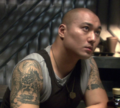Arts and Literature of the Twelve Colonies: Difference between revisions
More actions
→Literature: + Autobiographical re:Daniel Graystone's book |
→Autobiographical: +backtalk |
||
| Line 16: | Line 16: | ||
''{{inlineref|The Man Who Could See the Future|bold=N}}'' is the autobiography of [[Daniel Graystone]], published as of [[YR42]]. | ''{{inlineref|The Man Who Could See the Future|bold=N}}'' is the autobiography of [[Daniel Graystone]], published as of [[YR42]]. | ||
[[Baxter Sarno]] references it [[ | [[Baxter Sarno]] references it [[Backtalk with Baxter Sarno|in his show's monologue]], joking that it should have instead been titled ''Wow, I Didn't See That Coming'' following the public revelation regarding [[Zoe Graystone]]'s involvement in the [[Maglev 23]] bombing {{CAP|Reins of a Waterfall}}. | ||
===Religion=== | ===Religion=== | ||
Revision as of 22:43, 13 September 2020
- This article discusses an aspect of the Re-imagined Series version of the Twelve Colonies. For information on the Original Series version, see The Twelve Colonies (TOS).
The Twelve Colonies, like most civilizations, have a rich historical record of arts and literature as well as other works. Their democratic republic gives its citizens many freedoms of expression in addition to freedom of the press. Colonials have paintings, abstract designs and a variety of musical traditions.
Additionally, many functional items produced on the Colonies adhere to an aesthetic, even at a cost to efficiency.
| Part of the series on | ||||||||||||
|
| ||||||||||||
Literature
Autobiographical
The Man Who Could See the Future is the autobiography of Daniel Graystone, published as of YR42.
Baxter Sarno references it in his show's monologue, joking that it should have instead been titled Wow, I Didn't See That Coming following the public revelation regarding Zoe Graystone's involvement in the Maglev 23 bombing (CAP: "Reins of a Waterfall").
Religion
The Physics of Religion and Spirituality
A copy of The Physics of Religion and Spirituality is included in the package of Zoe Graystone's personal effects that Natalie Stark gives to Amanda Graystone at Apollo Park (CAP: Rebirth).
Political
Tom Zarek's book
Tom Zarek's book is a political book of Tom Zarek's beliefs, which he wrote while imprisoned. The manuscript is smuggled from his prison and published, but due to its yet-unspecified content, the book became banned in certain places throughout the Twelve Colonies, particularly the fleet academy.
During the incident on the Astral Queen, Captain Lee Adama tells Zarek that he read the book and that it challenged the way he thought about things on the Colonies (TRS: "Bastille Day").
My Triumphs, My Mistakes
- Main article: My Triumphs, My Mistakes
After returning to the The Fleet months after the exodus from New Caprica, Gaius Baltar wrote his manifesto, in which he criticizes the Colonial government system and highlights the class factions between the "Caprican elite" and the lower classes in the Colonies. Much like Tom Zarek's book, Baltar's manifesto was smuggled out by his lawyer and published, despite attempts to ban and destroy the book by Laura Roslin and her supporters (TRS: "Dirty Hands" and "The Son Also Rises""[[|]]")[[Category:]].
Prose
Dark Day
Edward Prima is the author of the novel Dark Day.
William Adama, who had Dark Day in his personal library on Galactica, gives it to Laura Roslin as a gift (TRS: "Water"). She considers it to be "one of those classics I've never gotten around to reading." Given the context of their conversation, notably Roslin's reference to A Murder on Picon, it is likely a mystery.
Roslin returns the book, to Adama's consternation, after the prognosis of her illness sharply worsens (TRS: "Flight of the Phoenix").
The French Lieutenant's Woman
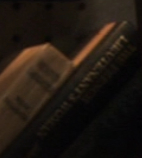
The French Lieutenant's Woman[1] is part of William Adama's formidable library of books on Galactica.
It is located on the shelf behind the couch in Adama's quarters (TRS: "Black Market").
A Murder on Picon
A Murder on Picon is a mystery novel, apparently taking place on Picon.
Laura Roslin brought the book with her on the trip to Galactica prior to its decommissioning ceremonies (TRS: "Miniseries" and "Water").
Blood Runs at Midnight
A mystery novel given to William Adama by President Roslin as a gift (TRS: "A Day in the Life").
Love and Bullets
A murder mystery written by Nick Taylo that is set in Caprica City. Adama reads part of the book to Roslin when she lies in Galactica's sickbay to receive Doloxan treatments (TRS: "The Ties That Bind").
- See The Ties That Bind#Noteworthy Dialogue for an excerpt.
Searider Falcon
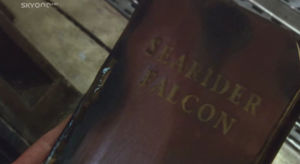
Another book Adama reads to Roslin. Adama calls it a classic, and both say that it is one of their favorites (TRS: "Escape Velocity"). Roslin takes it with her when she visits the rebel baseship (TRS: Guess What's Coming to Dinner) and Adama finds it shortly later in a derelict Raptor that escaped from a battle with the Cylons. When Adama decides to stay behind the Fleet in a Raptor in order to find Roslin, he takes the book with him (TRS: "Sine Qua Non").
- The raft was not as seaworthy as I'd hoped. The waves repeatedly threatened to swamp it. I wasn't afraid to die. I was afraid of the emptiness that I felt inside. I couldn't feel anything. And that's what scared me. You came into my thoughts. I felt them. It felt good.
Poetry
A Poet's Dream
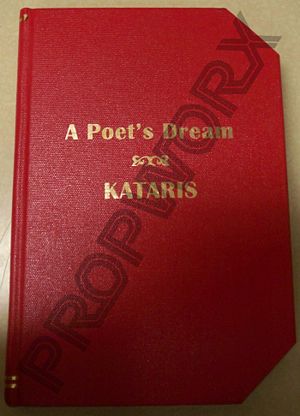
A Poet's Dream is a compilation of poems from the Caprican poet Kataris. Lieutenant Palladino owns a bound edition of this book and threatens Colonel Tigh with lines from a poem within:
From the darkness you must fall
Failed and weak, to darkness all.
At least one of the poems from this compilation is quite well-known amongst Colonials. Kara Thrace recognizes the above quotation, recalls from which piece it comes, and knows the poem's quality relative to his other works. D'Anna Biers identifies Palladino's copy on sight in a recording she is editing (TRS: "Final Cut"). Later, Gaius Baltar has a copy of this book in his cell on Galactica (TRS: "Dirty Hands").
Children
Muffit's Really Big Adventure
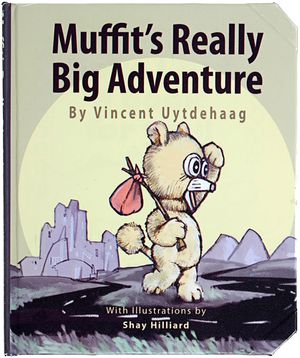
Featuring the character of Muffit, this book was written by Vincent Uytdehaag and illustrated by Shay Hilliard. (CAP: "False Labor," eBay & Propworx).
Dragon Fighters of Kobol
A fantasy book, Dragon Fighters of Kobol featured dangerous monsters as part of its story. Zoe Graystone was a fan of the book as a child. (CAP: "Here Be Dragons").
Periodicals
Law books
Caprican Criminal Codes is a multi-volume collection of Caprican law (TRS: "A Day in the Life").
Trial Tactics and Strategies and Law and Mind: The Psychology of Legal Practice are two books about the the practice of law, written by Joseph Adama, William Adama's father (TRS: "The Son Also Rises" and "Crossroads, Part I""[[|]]")[[Category:]].
Visual Arts
Representationalist
Monclair
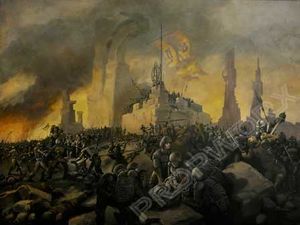
Monclair was a Colonial painter. One of his original paintings, a stylized depiction of the Cylon War, adorns William Adama's quarters on Galactica. He is apparently of considerable renown, given Gaius Baltar's impressed reaction to the piece (TRS: "Bastille Day").
Notes
- In Battlestar Galactica: Season Zero 4 (which exists in a separate continuity), Colonial Intelligence agent Levin comments on the painting, noting Adama's "expensive tastes". Additionally, Levin knowingly mentions that the painting was a gift from Julian DiMarco, Adama's friend and former commander.
- According to Battlestar Galactica: The Official Companion, the painting hanging in Adama's quarters was made by additional art director Ken Rabehl.
Abstract
Kara Thrace
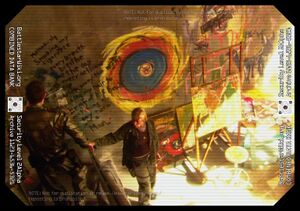
Between tours of duty, Kara Thrace was an enthusiastic painter. Karl Agathon is surprised to discover this side of her when they visit her apartment in Delphi (TRS: "Valley of Darkness"). Curiously, a specific design that Thrace has doodled as a child would be found more than two years later inside an ancient temple of the Thirteenth Tribe, without Thrace or Helo understanding why she would be aware of the design (TRS: "Rapture").
Film
The Tauron Line
The Tauron Line is a war film produced several decades before the Fall of the Twelve Colonies. It is possibly set during the Tauron Civil War.
The plot of the film is unknown. At one point in the film, the antagonists booby-trap an item with explosives, then wait for the protagonists to pick it up and take it somewhere before detonating it. Samuel Anders uses this scene as inspiration for the Caprica Resistance's first attack on the Cylons (TRS: "The Plan").
According to Serge's Twitter Account, Daniel and Amanda Graystone are fans of the film.
Tattoos
Tauron Tattoos
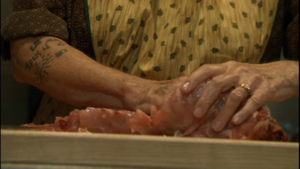
Many Taurons sport tattoos, from which can be read essential aspects of their life stories, including familial connections. The most extensive tattoos are found among members of the Ha'la'tha crime syndicate, and many Capricans associate the practice with the Ha'la'tha (CAP: Gravedancing). However, members of the Heracleides militia were also thusly illustrated (CAP: Dirteaters).
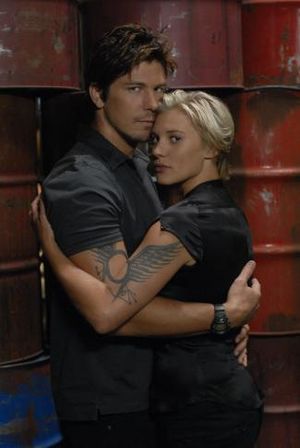
Instead of wearing wedding rings, Samuel Anders and Kara Thrace[2] created tattoos on their arms that, when they embrace, form a unified circle with wings. The symbol for the colony of Caprica is also in view[3].
From a behind-the-scenes perspective, Michael Trucco adds that it is their wedding band, but that this is never fully explained in the show. Further, these matching tattoos are applied by the makeup department.
Other
Felix Gaeta displays a tattoo of a rather large tiger during his interview with D'Anna Biers (TRS: "Final Cut"). Gaeta indicated he was quite inebriated with ambrosia to minimize the pain of the tattoo.
Socinus has a tattoo of an Aries design on his right arm (TRS: Kobol's Last Gleaming, Part I).[4]
An unnamed pilot has many tattoos on both upper arms, depicting a tiger and a dragon, among other things.
Vireem, specialist aboard the battlestar Pegasus, has a complex tattoo on his shoulder (TRS: "Pegasus""[[|]]")[[Category:]][5].
-
Gaeta's tiger tattoo.
-
Socinus's tattoo.
-
The unnamed tattooed pilot.
Sculpture
In addition to the Arrow of Apollo, the Delphi Museum of the Colonies contains a large collection of ancient pottery. Located in numerous display cases in the exhibit halls spanning the museum's levels, this large collection of vases, jars, pots and stone fragments form a rough outline of the Colonials' artistic history. Many of the artifacts and art pieces are quite elaborate and appear to be in the detailed Corinthian Style.
Music
Dreilide Thrace
Dreilide Thrace was a pianist. His daughter Kara kept recordings of some of his piano arrangements in her Delphi apartment (TRS: "Valley of Darkness").[6] At some point in his career, he recorded an album, Dreilide Thrace: Live at the Helice Opera House (TRS: "Someone to Watch Over Me").
Colonial Anthem
The Colonial anthem is heard as a short fanfare over the Viper flyby during Galactica's decommissioning ceremony and as a background music at the beginning of Baltar's television interview (TRS: "Miniseries"). Its third, and longer, appearance is as background music for the rousing closing speech of D'anna Biers's documentary on the Colonial military (TRS: "Final Cut").[7]
Popular music
Popular Colonial music can be heard in Boomer's apartment on Caprica in the episode "Downloaded" and in Joe's bar in "Taking a Break From All Your Worries". Another song is playing as Lee Adama enters the bar on Prometheus (TRS: "Black Market") [8].
In addition, a popular sing-a-long song is "99 Bottles of Ambrosia"[9], which Marcia Case throws out there as a recommendation after Kara Thrace comments on the humdrum of their up-until-then-uneventful search and rescue mission for a missing Raptor (TRS: "Razor").
Roughly 60 BCH, musical styles emerged on Caprica and Tauron, themselves later repeated more than 150,000 years later on the second Earth; these include alternative hip-hop, of which the only known artists are Tauron (CAP: The Reins of a Waterfall) as well as forms of punk rock and dance music (CAP: "Pilot").[10]
Aesthetics
Colonial aesthetics lead to an avoidance of right angles.
Octagons
Colonial printouts, photographs, videos, and data discs are rarely rectangular; the corners are trimmed at 45 degree angles, creating snub rectangles, i.e. octagons. The reasoning for this is likely based on their aversion to right angles, as rectangles are, particularly for paper, more efficient[11].
This design choice is also evident in Colonial computer systems with windows and menus often having clipped corners.
Hexagons
In the Re-imagined Series, hexagons feature significantly as dog tags, playing cards, glass bottles and many other objects. This likely reflects both the dislike of right angles and the simplicity of polygons over curved shapes.
Pentagons
While not a part of Colonial society per se, pentagons play a large part in the architecture of the lone Thirteenth Tribe structure encountered by the Colonials thus far, the Temple of Five. Much like the Colonials, it appears at least the ancient members of the Thirteenth Tribe were also wary of right angles.
Architecture
Federal Period
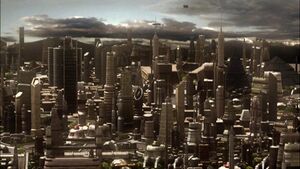
This style was mix of older and newer trends, utilizing traditional stone facades along with glass and steel. This architecture was found throughout Caprica City, Delphi, and other unnamed cities prior to the Cylon attack.
Several buildings in Caprica City had the form of a pyramid, but the cultural significance of this design choice is unknown [12].
Ancient Kobol
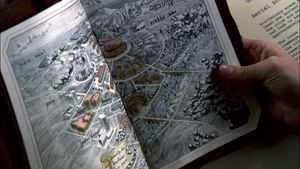
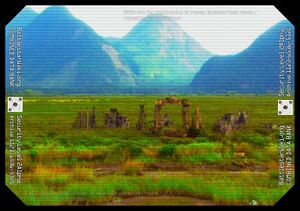
In "Kobol's Last Gleaming, Part I", Roslin looks at schematics for the City of the Gods on Kobol. Its buildings, such as the Temple, Forum, and the Opera House, were made of stone and range in shape and size, and resemble classical Greco-Roman architecture.
Later, the ruins of the Opera House are seen when Gaius Baltar and others crash-land nearby. The building was made of stone and utilized decorative columns and pillars. While there, Baltar has a vision which may have represented the original appearance of the Opera House before it fell into disrepair.
Polygonal Architecture
Many places and objects within Galactica reflect early aesthetic choices that eschew right-angular forms. Many corridors, including ship bulkhead doors, are hexagonal. CIC elements, particularly the Command & Control Center table, the tactical station table, and even the alignment of the displays of the DRADIS console, form a hexagonal appearance.
This aesthetic appears to have waned during the construction of more advanced battlestars such as Pegasus, which uses far fewer hexagonal shapes.[13]
References
- ↑ This is likely a gaffe and never intended to be seen on screen in detail. See: Continuity errors (RDM) for additional information on this book's appearance.
- ↑ Actress Katee Sackhoff has a number of personal tattoos on her body. The crew uses various means to cover or block these tattoos from view during filming, but the results are not always perfect. See the article on Katee Sackhoff for details.
- ↑ In a TV Guide photoshoot video interview, Katee Sackhoff comments: "...the tattoos that Anders and Starbuck got when they got married and uh, it kinda looks like the Redwings sign doesn't it? Or logo, but its, um... when he's holding me the rings match up and it becomes one ring with two wings. So it's very cool there's some signs in there like the Caprica symbol and some space things and its all very intricate and very cool and the guys over at Twin Villain Tattoo down in Gastown designed it so we're all very excited about it."
- ↑ It is not yet known if the tattoo belongs to Alonso Oyarzun or if it is purely for the character of Socinus, as both the actor was born under the sign of Aries and the character is a colonist of Aerelon.
- ↑ Visible on his left shoulder in the "little robot girl" sequence, apparently a Chinese-style dragon and a Chinese character over a spiral background that could be a galaxy.
- ↑ According to Battlestar Galactica composer Bear McCreary, the piece attributed to Thrace's father is actually Metamorphosis Five, composed by Philip Glass, from his 1989 album Solo Piano.
- ↑ In reality, this is the Original Series theme by Stu Phillips. For "Final Cut", the piece was specially re-arranged by Bear McCreary.
- ↑ This is only a small part of the song that was composed for the episode by Bear McCreary. The full 5 minute long version is available on the Season 2 soundtrack.
- ↑ This is clearly the Colonial version of "99 Bottles of Beer".
- ↑ McCreary, Bear (23 April 2009). The Themes of "Caprica" (backup available on Archive.org) (in ). Retrieved on 26 February 2010.
- ↑ This developed out of a discussion between Richard Hudolin, Ron Moore, David Eick and Michael Rymer. It was felt that cutting the corner of most documents is an easy way to make the look a bit unconventional and unfamiliar. Hudolin also states that not all documents are clipped, but that classified ones definitely are (Battlestar Galactica: The Official Companion, p.140)
- ↑ This is a reference to the Caprica of the Original Series, which was influenced by Egyptian mythology and symbolism.
- ↑ The sets for Pegasus were purchased from a failed series pilot for a Lost in Space series remake. As such, the sets adhere to "earthly" rectangular design, and budget constraints for Battlestar Galactica likely limited any large modifications.



